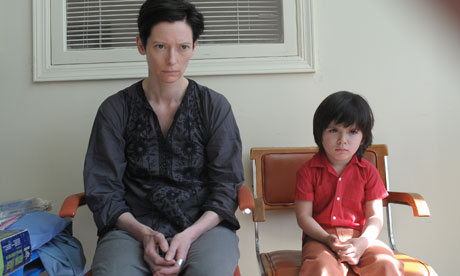*Better late than never*
Misconception is a funny thing. Having heard great things about Lionel Shriver's novel We Need To Talk About Kevin, and excited at the prospect of an adaptation directed by Lynne Ramsay, I deliberately cut myself off from information about the about the book and the film. By the time I made my way to the cinema to see it, the only information I had been unable to escape was that it was about the mother of a boy who commits a Columbine style high school massacre (Everyone knows this right? Surely it can't be considered a spoiler.) But if I had been expecting a film thematically similar to Gus Van Zant's Elephant, I was mistaken. The specifics of Kevin's crime, while horrific, are totally irrelevant. The film is not about high school massacres, but about parenthood, and the relationship between Kevin and his mother Eva.
When we are first presented with Eva (Tilda Swinton), we are told nothing about her save for what we can glean from her haggard appearance, hermit lifestyle and the accusatory whispers that follow her everywhere. With a complex narrative structure that jumps backwards and forwards, we catch glimpses of her life before she became a mother and during Kevin's childhood. Although we begin to fill in the details, we are never entirely sure that what we are seeing is the full, objective story. From the moment he is born, Kevin seems to be evil incarnate, with a brooding glare to match Damien from The Omen. People who have criticised this less than subtle negative characterisation seem to have missed the point. We see Kevin as Eva sees him, and she is anything but a reliable narrator. However, the lack of any other perspectives means we never know how much of Kevin's seemingly evil behaviour is real, and how much is being exaggerated by Eva to mask her own failings as a mother. Coupled with the non-linear narrative, all this makes watching We Need To Talk About Kevin rather like trying to complete a jigsaw with only half the pieces and while blinfolded. It's an unsolvable puzzle of a movie, but Ramsay manages to stay one step ahead without ever patronising or condescending her audience.
The cast are incredible, with Swinton giving a surprisingly understated performance, which contrasts sharply with the unashamedly sinister Ezra Miller. John C Reilly also seems to have been overlooked by most for his role as Kevin's father Franklin, who refuses to believe that Kevin is anything other than a 'sweet little boy'. Ramsay however, is the star of the film; her stylised direction adding to the film's unsettling tone and making it seem like a much bigger budget movie than it actually is. All in all, it's a surprisingly low key affair that will probably be overlooked by the major awards who tend to favour flashier films, but it is an unnerving puzzle of a movie that refuses to give you any easy answers, and keeps raising questions long after it's credits have rolled.




